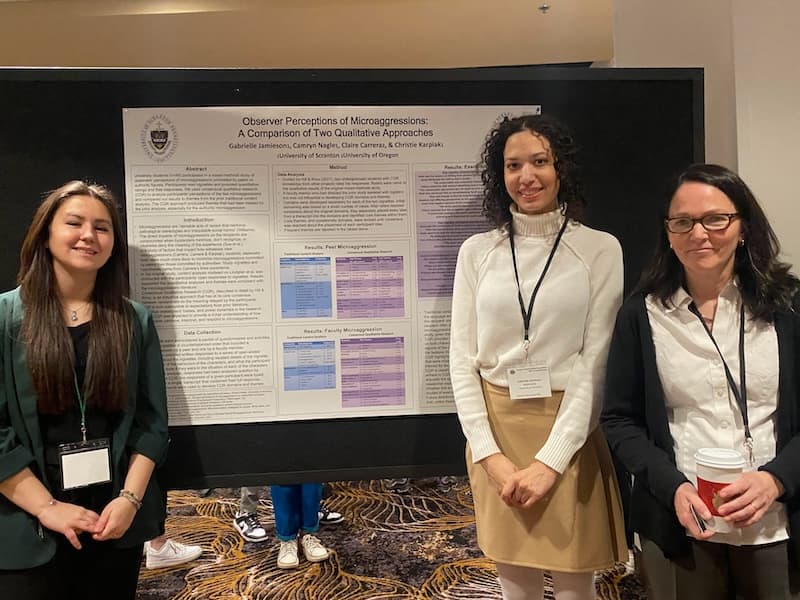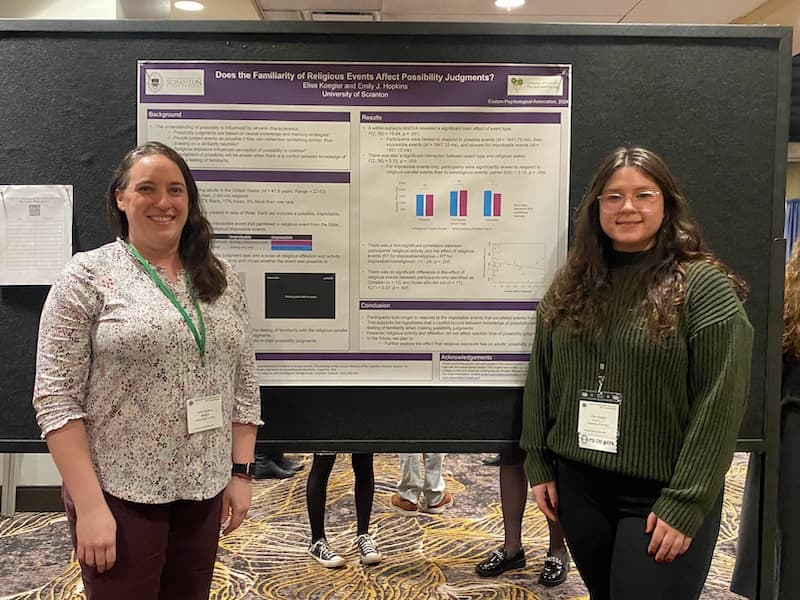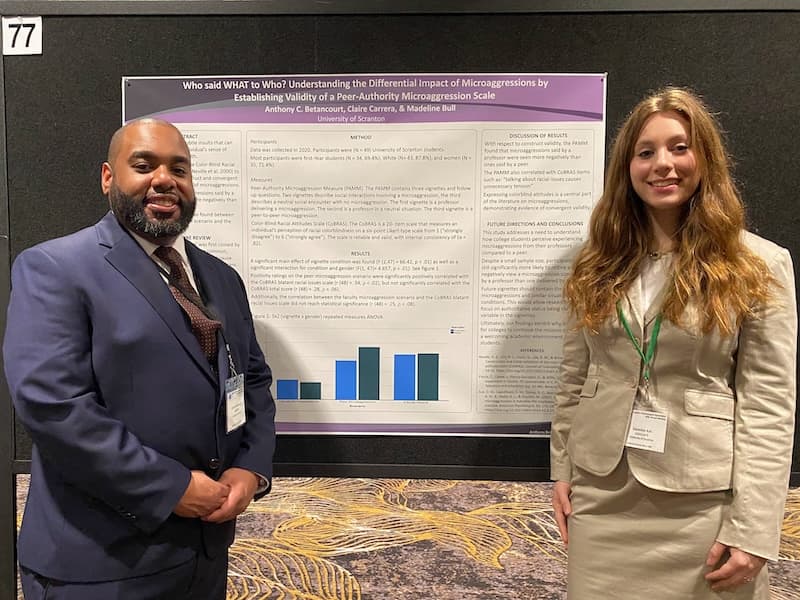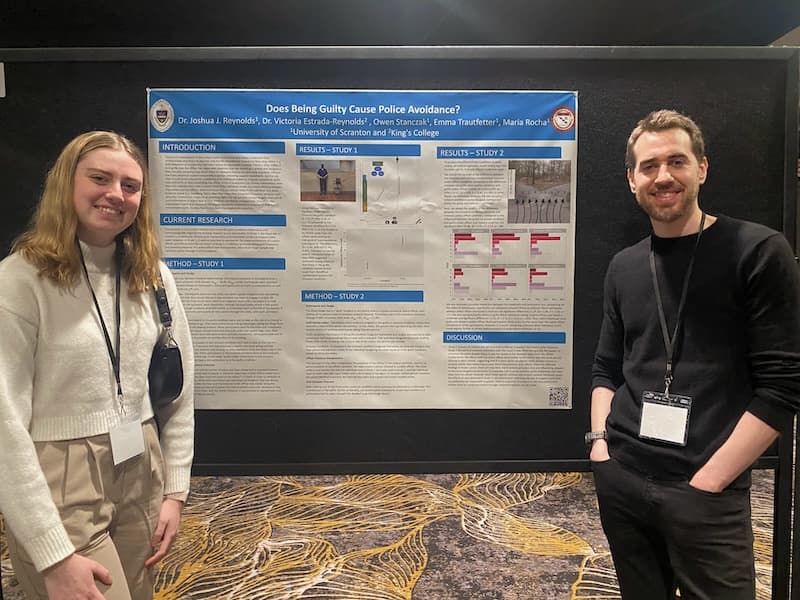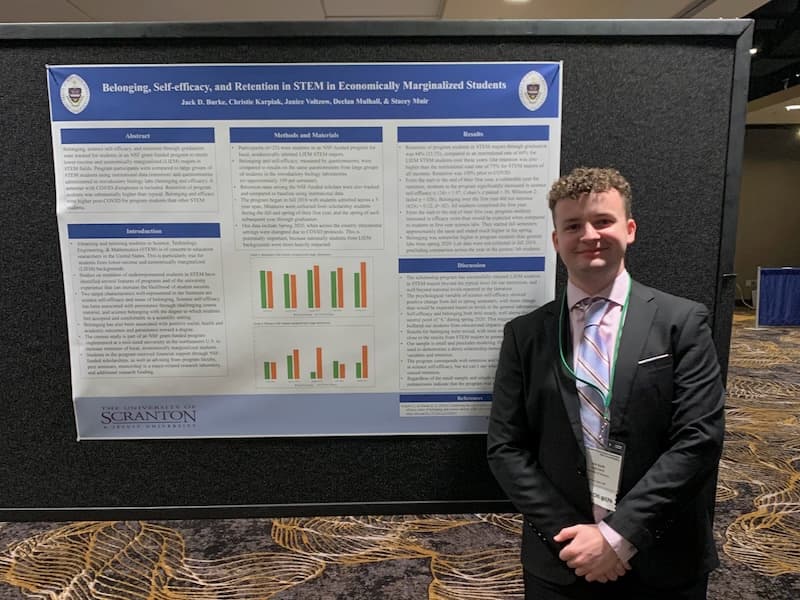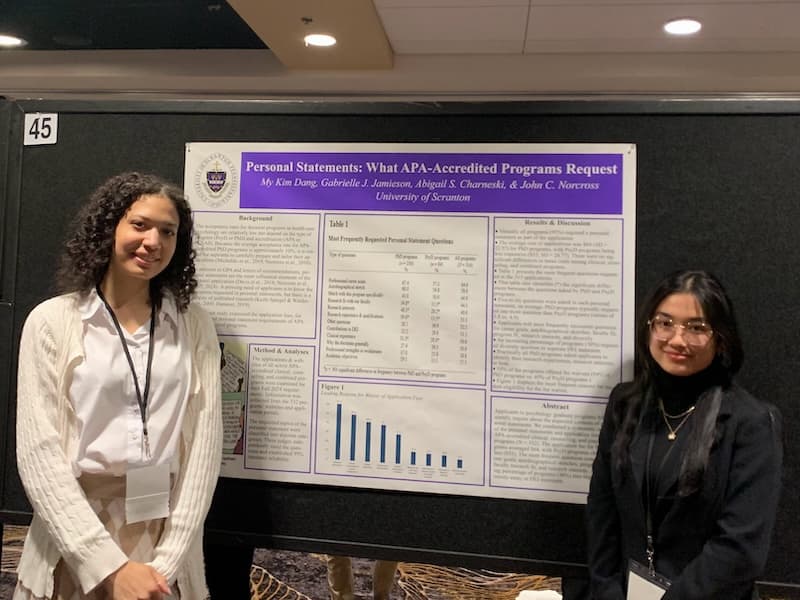Research Presented at Eastern Psychological Association Conference
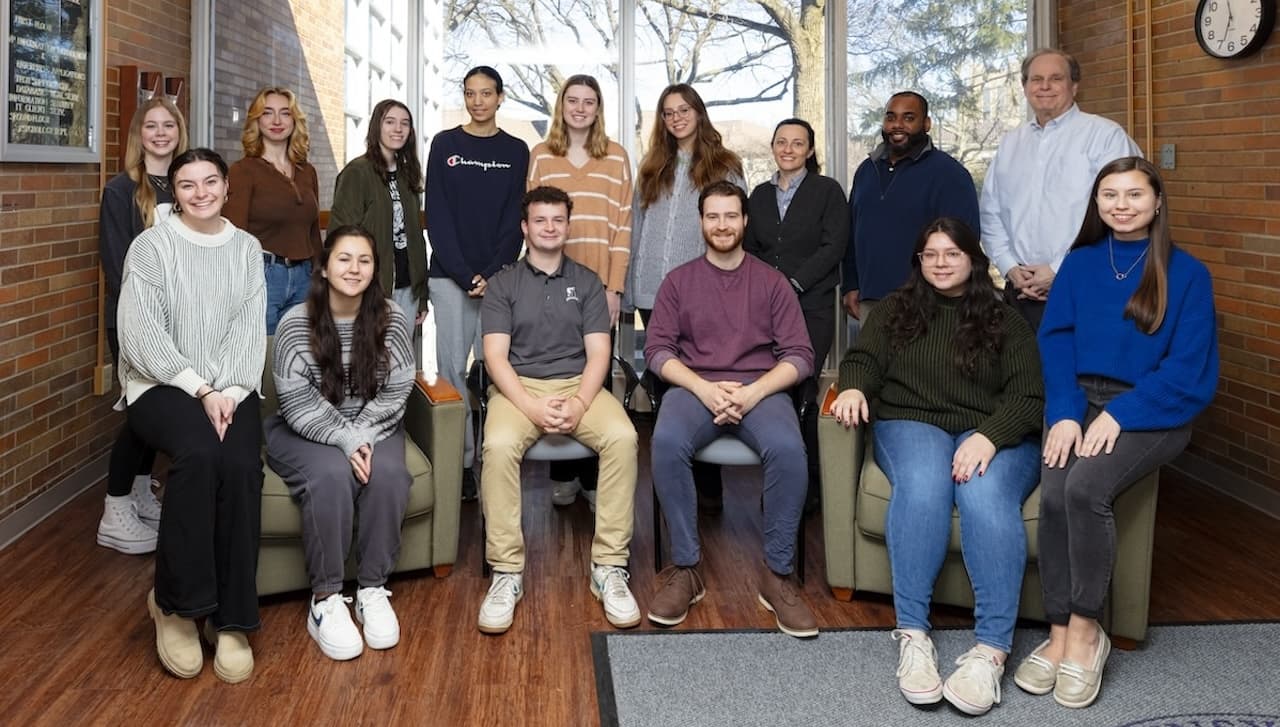
The research of 15 University of Scranton undergraduate students, six recent graduates and nearly a dozen professors was presented at the 2024 annual Eastern Psychological Association conference, which took place Feb. 29 to Mar. 2 in Philadelphia. In total, a dozen research posters and papers were presented at the conference.
The Eastern Psychological Association, founded in 1896, is the oldest of the regional Psychological Associations in the United States.
A list of the students whose research was presented at the conference, their project and the faculty members they worked with on their projects follows.
Madeline R. Bull, a psychology major from Mendham, New Jersey, presented research titled “Who said what to who? Understanding microaggressions using the peer authority microaggression scale” with faculty member Anthony Betancourt, Ph.D., assistant professor of psychology, and Claire Carrera, University of Oregon.
Jack Burke, a psychology major from Dublin, Ireland, presented research titled “Belonging, self-efficacy, and retention in stem in economically marginalized students” with faculty members Christie Karpiak, Ph.D., professor of psychology, Janice Votlzow, Ph.D., professor of biology, Declan Mulhall, Ph.D., professor of physics and engineering, and Stacey Muir, Ph.D., professor of mathematics.
Abigail Charneski, a neuroscience major from Kingston, presented research titled “Personal statements: what apa accredited programs request” with faculty member John Norcross, Ph.D., Distinguished Professor of Psychology.
Erica C. Czerwinski, a psychology major from Burlington, Massachusetts, presented research titled “Getting the punch line: effects of verbal working memory on joke comprehension” with faculty member Jill Warker, Ph.D., associate professor of psychology.
Kim Thia M. Dang, a psychology and counseling and human services double major from Scranton, presented research titled “Getting the punch line: effects of verbal working memory on joke comprehension” with faculty member Jill Warker, Ph.D., associate professor of psychology. Dang also presented research titled “Personal statements: what apa accredited programs request” with faculty member John Norcross, Ph.D., Distinguished Professor of Psychology.
Emily E. Fick, a neuroscience major from Archbald, presented research titled “Getting the punch line: effects of verbal working memory on joke comprehension” with faculty member Jill Warker, Ph.D., associate professor of psychology.
Gabrielle J. Jamieson, a psychology major from Bradley Beach, New Jersey, presented research titled “Observer perceptions of microaggressions: a comparison of two qualitative approaches” with Claire Carrera, University of Oregon, and Christie Karpiak, Ph.D., professor of psychology. Jamieson also presented research titled “Validation of the short environmental action scale (seas)” with faculty member Jessica Nolan, Ph.D., professor of psychology, and the study “Personal statements: what apa accredited programs request” with faculty member John Norcross, Ph.D., Distinguished Professor of Psychology.
Morgan E. Jones, a psychology and philosophy double major from Cherry Hill, New Jersey, presented research titled “Getting the punch line: effects of verbal working memory on joke comprehension” with faculty member Jill Warker, Ph.D., associate professor of psychology.
Elise S. Koegler, a psychology major from Scranton, presented research titled “Does the familiarity of religious events affect possibility judgments?”
Erin T. Lona, a psychology major from Scranton, presented research titled “Family environment adjective list: factor analysis of a new 6-item scale” with faculty members Elizabeth Vento, visiting assistant professor of psychology, Anthony Betancourt, Ph.D., assistant professor of psychology, and Wilson McDermut, Ph.D., associate professor of psychology at St. John’s University.
Camryn Nagle, a psychology major from Hillsdale, New Jersey, presented research titled “Observer perceptions of microaggressions: a comparison of two qualitative approaches” with Claire Carrera, University of Oregon, and Christie Karpiak, Ph.D., professor of psychology.
Owen J. Stanczak, a psychology and philosophy double major from Bloomingdale, New Jersey, presented research titled “Predicting perceptions of the justification of officer-involved shootings using decision trees” with faculty member Joshua Reynolds, Ph.D., assistant professor of psychology. Stanczak also presented research titled “Validation of the short environmental action scale (seas)” with faculty member Jessica Nolan, Ph.D., professor of psychology, and the study “Does being guilty cause police avoidance?” with faculty members Joshua Reynolds, Ph.D., assistant professor of psychology, and Victoria Estrada-Reynolds, Ph.D., professor of psychology at King’s College.
Emma C. Stauffer, a psychology major from Leesport, presented research titled “Family environment adjective list: factor analysis of a new 6-item scale” with faculty members Elizabeth Vento, Ph.D., visiting assistant professor of psychology, and Anthony Betancourt, Ph.D., assistant professor of psychology, and Wilson McDermut, Ph.D., associate professor of psychology at St. John’s University.
Emma Trautfetter, a psychology major from Cedar Grove, New Jersey, presented research titled “The effect of event type on false memory in a misinformation task” with faculty member Jill Warker, Ph.D., associate professor of psychology. Trautfetter also presented research titled “Validation of the short environmental action scale (seas)” with faculty member Jessica Nolan, Ph.D., professor of psychology, and the study “Does being guilty cause police avoidance?” with faculty members Joshua Reynolds, Ph.D., assistant professor of psychology, and Victoria Estrada-Reynolds, Ph.D., professor of psychology at King’s College.
Madeline S. Williams, a psychology and philosophy double major from Wall Township, New Jersey, presented research titled “Predicting perceptions of the justification of officer-involved shootings using decision trees” with faculty member Joshua Reynolds, Ph.D., assistant professor of psychology.
Also presenting at the conference were recent graduates of Scranton.
Olivia Basalyga, a 2021 graduate of the University from Clarks Summit, Alexa Bobko, a 2022 graduate of the University from Cranford, New Jersey, Carly Bock, a 2021 graduate of the University from Cedar Grove, New Jersey, and Charlotte Hacker, a 2021 graduate of the University from Greenwich, Connecticut, presented research titled “Validation of the short environmental action scale (seas)” with faculty member Jessica Nolan, Ph.D., professor of psychology. Maria Rocha, a 2023 graduate of the University from Bound Brook, New Jersey, presented research titled “Does being guilty cause police avoidance?” with faculty members Joshua Reynolds, Ph.D., assistant professor of psychology, and Victoria Estrada-Reynolds, Ph.D., professor of psychology at King’s College, and several Scranton undergraduate students. Claire Carrera, a 2023 graduate of the University from North Bergen, New Jersey, now at the University of Oregon, presented research titled “Observer perceptions of microaggressions: a comparison of two qualitative approaches” with Christie Karpiak, Ph.D., professor of psychology, and several Scranton undergraduate students; and “Who said what to who? understanding microaggressions using the peer authority microaggression scale” with faculty member Anthony Betancourt, Ph.D., assistant professor of psychology, and University undergraduate students.
In addition, Emily J. Hopkins, Ph.D., assistant professor of psychology, presented research titled “Does the familiarity of religious events affect possibility judgments?”
Additional information about many undergraduate research opportunities offered by the Psychology Department at The University of Scranton can be found on the department’s webpage.




